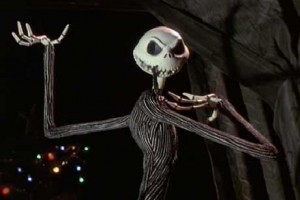On the 6th Day of (The Nightmare Before) Christmas…
 …my true love gave to me: UNCHANGEABLE NATURE?
…my true love gave to me: UNCHANGEABLE NATURE?
“What have I done? What have I done? How could I be so blind? All is lost, where was I? Spoiled all… spoiled all; everything’s gone all wrong.”
Edward Scissorhands can’t adapt to sunny suburbia and is exiled to his grey castle. Catwoman can’t reconcile her issues and live happily every after in Batman Returns (and the sewer-raised circus freak Penguin just doesn’t fit in the world above either, let alone Keaton’s tormented Bruce Wayne). Sweeney Todd’s inflexible darkness inevitably consumes everything he loves, and himself. A familiar theme in several of Tim Burton’s films seems to be: you cannot change who you are. It’s no wonder he’s aiming next at the melancholy Dark Shadows.
As we wrap up our unwrapping of The Nightmare Before Christmas, we find Jack in a cemetery, his sleigh shattered and his Santa substitution having wrought nothing but chaos and fear on earth. He awakens on the arms of an angel statue in one of the coolest images in the film, lamenting how he has failed utterly. By trying to mimic the magic of Christmas, he’s ruined it for everyone.
(Why does nothing every turn out like it should, Jack? Because the world is broken, and so are you.)
 Instead of repentance, however, jack pulls himself up by his bony bootstraps and… settles. It’s the most awkward transition in the film, and while I find it personally disingenuous, it represents the hopeless consolation prize many of us grab for.
Instead of repentance, however, jack pulls himself up by his bony bootstraps and… settles. It’s the most awkward transition in the film, and while I find it personally disingenuous, it represents the hopeless consolation prize many of us grab for.
“Well, what the heck I went and did my best… and I, Jack – The Pumpkin King – that’s right, I AM the Pumpkin King!”
The mixed message here seems to be when at first you don’t succeed… give up and go back to who you were before (try, try again is so last century). That may seem harsh, because I think certain elements of his reversion ring true. We can fall back on familiar phrases like “don’t try to be something (or someone) you’re not” and, in certain situations, this may serve as good advice. Some people try to be what they think others want them to be, abandon unique qualities because they want to fit in, and don’t embrace who they were built and made to be. However, the deeper chord here is an ultimate notion that you cannot change who you are. While that allows us to justify ourselves, is it REALLY what we want?
We don’t truly want to believe change is impossible. That would make us all essentially Dexter Morgan, hiding our dark parts and struggling to manage our unalterable, damaged condition. When we don’t want to change, we use the Poor Jack defense, but we equally hope there are aspects of ourselves and others, that can be transformed… habits we can transcend, darkness (internal and external) we can be delivered from. The even more tragic notion of Jack’s assumption, in a community sense… is segregation. Just as Edward Scissorhands has to retreat to his dark attic, Jack needs to “stick with his own”. He’s not fit for Christmastown. This is not a message of peace or reconciliation, but resignation and relegation.
 Jack’s problem is that he only saw two options: change himself and master Christmas, or embrace his old nature and be the best Halloween monster he can be. If this were a story by John Milton, Jack’s lyrics would have been “Better to rein in Halloween than serve in Christmas.” He exhibits some worldly sorrow, but with a “what the heck” pats himself on the back for trying and decides he’ll go back to who he was before.
Jack’s problem is that he only saw two options: change himself and master Christmas, or embrace his old nature and be the best Halloween monster he can be. If this were a story by John Milton, Jack’s lyrics would have been “Better to rein in Halloween than serve in Christmas.” He exhibits some worldly sorrow, but with a “what the heck” pats himself on the back for trying and decides he’ll go back to who he was before.
What if change was possible, but not by his own skeletal hands? Might he have asked Santa to help him change? Could he have asked the Master of Christmastown what it would really take to be a citizen of that kingdom? Did he ask the Lord of Christmas to let him humbly serve and learn? Unfortunately, no. The story puts a big mirror up to our own folly – crooked skeletons striving to manifest flesh on our own bones, by our own power instead of simply asking our King and Creator to invigorate our marrow and reclothe us in the skin of human kindness. We can be transformed… just not by our own power. Our nature can be changed by the Lord of nature.
“I hope there’s still time to set things right…”
I’ll give Jack some grace here: his actions demonstrate some repentance in that he returns to Halloweentown and seeks to make amends. The Pumpkin King doesn’t stand condemned… because he’s still walking. His journey isn’t over, and we’ll see the glimmer of hope the story sheds on the 7th Day of (The Nightmare Before) Christmas…

